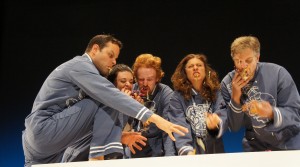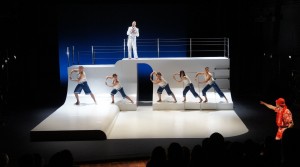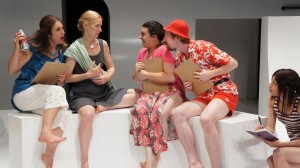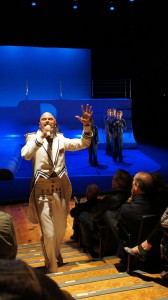AFLOAT ON HIGH ASPIRATIONS
Many positive things can and should be said about Sheila Callaghan’s Port Out, Starboard Home, a play about a three-day cruise at the end of which the passengers participate in a secret, transformative ritual. The play is an allegory, an indictment of thoughtless first-world consumerism, as well as materialism, superficiality, and the idea that personal happiness is a worthwhile life goal. The choice to explore these themes shows the playwright to be a well-intentioned, thoughtful artist.  Likewise admirable is Ms. Callaghan’s brave decision to express her ideas in an unconventional, stylized form. Her objective seems to be to create a holistic, surreal experience, something like a piece of performance art, with words and actions seemingly designed less to illustrate individual characters and more to show archetypes that serve as parts of a single organism. There are a number of funny, clever, and entertaining moments in the play, enjoyable performances, as well as a powerful climax. To be sure, Port Out, directed by Ben Yalom, is a worthwhile outing; it’s just not quite as good as its concept. To use a drawing analogy, the work has a strong, dynamic and very ambitious outline, but the shading within – the details – want for density and sharpness.
Likewise admirable is Ms. Callaghan’s brave decision to express her ideas in an unconventional, stylized form. Her objective seems to be to create a holistic, surreal experience, something like a piece of performance art, with words and actions seemingly designed less to illustrate individual characters and more to show archetypes that serve as parts of a single organism. There are a number of funny, clever, and entertaining moments in the play, enjoyable performances, as well as a powerful climax. To be sure, Port Out, directed by Ben Yalom, is a worthwhile outing; it’s just not quite as good as its concept. To use a drawing analogy, the work has a strong, dynamic and very ambitious outline, but the shading within – the details – want for density and sharpness.
 As we enter the house we see Maya (Amy Prosser), a mysterious woman with the lean, bitter look of a middle-aged subscriber to some defunct new-age religion, walk up and down the ship’s deck cradling an infant in a sling. “This is your experience,†says Patrick Young, who plays a server on the cruise ship (set by Dan Stratton), handing us playbills as we take our seats. When the show begins we and the passengers (the idea being, seemingly, that we are also passengers on this ship) are greeted by Johnny O (Brian Livingston), an eccentric, Mephistophelean cruise director, who acts as both a kind of ringmaster and spiritual guide during the journey. The passengers, who also serve as the chorus, are Angela Santillo, Calder Shilling, Benjamin Stuber, Jessica Unker, Josiah Polhemus, and Deborah Eliezer.
As we enter the house we see Maya (Amy Prosser), a mysterious woman with the lean, bitter look of a middle-aged subscriber to some defunct new-age religion, walk up and down the ship’s deck cradling an infant in a sling. “This is your experience,†says Patrick Young, who plays a server on the cruise ship (set by Dan Stratton), handing us playbills as we take our seats. When the show begins we and the passengers (the idea being, seemingly, that we are also passengers on this ship) are greeted by Johnny O (Brian Livingston), an eccentric, Mephistophelean cruise director, who acts as both a kind of ringmaster and spiritual guide during the journey. The passengers, who also serve as the chorus, are Angela Santillo, Calder Shilling, Benjamin Stuber, Jessica Unker, Josiah Polhemus, and Deborah Eliezer.
 Ms. Callaghan’s play doesn’t have much of a plot, which isn’t necessarily problematic considering what she’s trying to do. Instead we spend most of the show (prior to the ritual) getting acquainted with the passengers as they mingle, show off their talents, dance, drink, and eat. The goal here is anything but naturalism: When the buffet cart gets brought out, for instance, they have at it like delirious chimps in a mad feeding frenzy. The performances have a certain deliberate self-consciousness: When Ms. Santillo’s Gayle does her wonderful tap-dance number and when Mr. Shilling’s Gary performs his rendition of Material Girl, accompanying himself on a ukulele, they are doing it for us, as opposed to, say, for other characters or for themselves in private; they are aware of the audience.
Ms. Callaghan’s play doesn’t have much of a plot, which isn’t necessarily problematic considering what she’s trying to do. Instead we spend most of the show (prior to the ritual) getting acquainted with the passengers as they mingle, show off their talents, dance, drink, and eat. The goal here is anything but naturalism: When the buffet cart gets brought out, for instance, they have at it like delirious chimps in a mad feeding frenzy. The performances have a certain deliberate self-consciousness: When Ms. Santillo’s Gayle does her wonderful tap-dance number and when Mr. Shilling’s Gary performs his rendition of Material Girl, accompanying himself on a ukulele, they are doing it for us, as opposed to, say, for other characters or for themselves in private; they are aware of the audience.
 Likewise, when interacting, personages often speak past each other, more to us than to others in the scene. These exchanges are without dramatic progression; relationships do not build and we don’t learn about the characters through conflict. The point of this seems to be, among other things, to suggest modern civilized individuals’ aloofness and isolation from the world and from themselves. As a result, however, the glimpses we get into these people, including ones provided by the chorus, are very sparse. This limited access makes it essential, it seems, that the bits of information we do get be perfect, with words that have the power of poetry and sentences the breadth of aphorisms. Unfortunately, while the ideas behind what Ms. Callaghan seems to be saying are pointed in the right direction, their formulation lacks the precision to make them universal enough for her play to completely work.
Likewise, when interacting, personages often speak past each other, more to us than to others in the scene. These exchanges are without dramatic progression; relationships do not build and we don’t learn about the characters through conflict. The point of this seems to be, among other things, to suggest modern civilized individuals’ aloofness and isolation from the world and from themselves. As a result, however, the glimpses we get into these people, including ones provided by the chorus, are very sparse. This limited access makes it essential, it seems, that the bits of information we do get be perfect, with words that have the power of poetry and sentences the breadth of aphorisms. Unfortunately, while the ideas behind what Ms. Callaghan seems to be saying are pointed in the right direction, their formulation lacks the precision to make them universal enough for her play to completely work.
 Another misstep is Ms. Callaghan’s choice to be explicit at the end of the play, about the “ritual†and about the meaning of what we have just seen. This takes the mystery out of the show, significantly undermining its emotional and spiritual afterglow. It also feels condescending – we’re not stupid, we get the point, no need to beat us over the head with it.
Another misstep is Ms. Callaghan’s choice to be explicit at the end of the play, about the “ritual†and about the meaning of what we have just seen. This takes the mystery out of the show, significantly undermining its emotional and spiritual afterglow. It also feels condescending – we’re not stupid, we get the point, no need to beat us over the head with it.
Mr. Yalom’s directing, while clearly very competent and enthusiastic, suffers from the same problem as Ms. Callaghan’s writing, in that it does not quite measure up to the aspirations of the play. The sense I get (perhaps erroneously) is that the production might have been a bit too collaborative for its own good. Rather than taking control and creating his own personal vision Mr. Yalom seems beholden to the script, directing it as written and, consequently, failing to overcome what shortcomings it has.
Choreographer: Erika Chong Shuch; Dramaturg: Scott Horstein; Voice & Movement Coach: Ms. Eliezer; Sound Designer: Dan Stratton; Lighting Designer: Lucas Krech; Costume Designer and Illustrator: Mr. Stuber.
photos by Ben Yalom
Port Out, Starboard Home
FoolsFURY at La MaMa First Floor Theater in New York City
scheduled to end on November 25, 2012
for tickets, call (212) 475-7710 or visit http://www.lamama.org/
